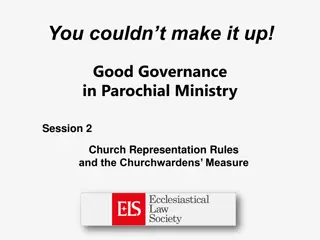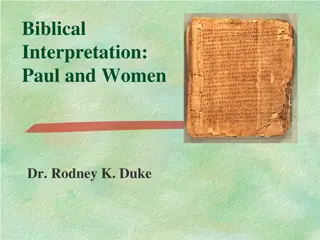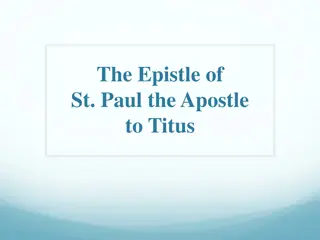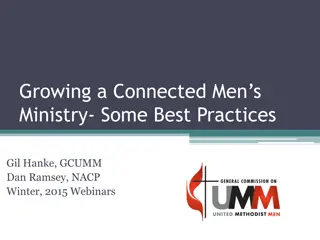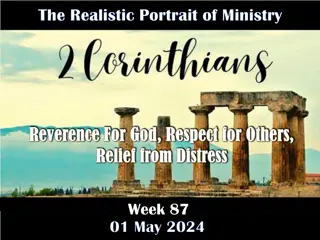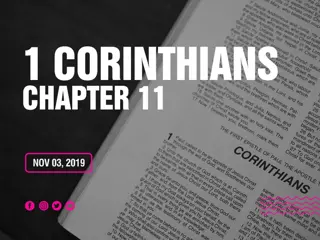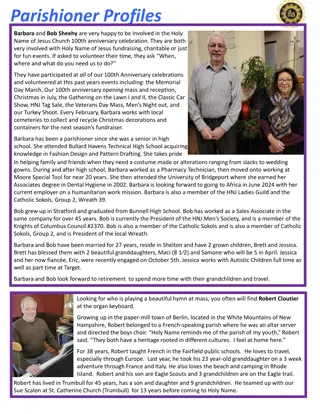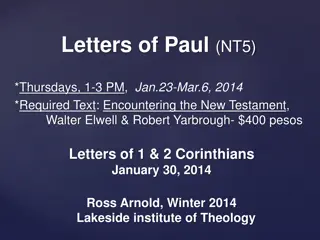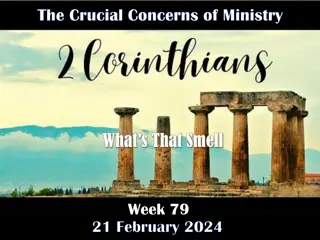Insights on Paul's First Letter to Corinthian Church
The Apostle Paul authored the letter to the Corinthians from Ephesus in AD 57. The city of Corinth, a thriving Roman colony, played a significant role in the Roman Empire's trade route. Despite facing challenges like moral issues within the church, the Corinthian Church consisted of a diverse congregation, including Jews and Gentiles. Paul addressed various issues faced by the church and emphasized the importance of living in accordance with the teachings of Christ.
Download Presentation

Please find below an Image/Link to download the presentation.
The content on the website is provided AS IS for your information and personal use only. It may not be sold, licensed, or shared on other websites without obtaining consent from the author.If you encounter any issues during the download, it is possible that the publisher has removed the file from their server.
You are allowed to download the files provided on this website for personal or commercial use, subject to the condition that they are used lawfully. All files are the property of their respective owners.
The content on the website is provided AS IS for your information and personal use only. It may not be sold, licensed, or shared on other websites without obtaining consent from the author.
E N D
Presentation Transcript
L E S S O N S I X Paul s First Corinthian Letter
Authorship The Apostle Paul wrote this letter Paul wrote this epistle possibly in the spring of the year AD 57 from Ephesus "But I will tarry at Ephesus until Pentecost" (I Corinthians 16:8)
Corinth The city of Corinth was a Roman colony, located on the Isthmus of Corinth This was on the principle trade route of the Roman Empire, from east to west Through the nature harbors of Corinth flowed the commerce of the world
Corinth The Romans had destroyed the city of Corinth in the year 146 BC but had been rebuilt of pure white marble by Julius Caesar 100 years later When Paul reached Corinth for the first time in the year AD 51 he found a thriving commercial city Corinth was called the vanity fair of the Roman Empire
The Corinthian Church Paul was the founder of the church during his second missionary journey Paul had labored for 18 months at Corinth and one of his greatest churches was founded here This church was troubled with cliques and there was an element of emotional people whose extremes degenerated into immorality
The Corinthian Church Yet, Paul addressed the church as the church of God, called to be saints, sanctified in Christ Jesus Some Jews had been converted but the majority of the church was Gentiles The membership of the church included slaves as well as free men a mix of both poor and wealthy status
The Purpose of the Corinthian Letter Apparently Paul wrote a letter before which is now lost, in which he scolded the Corinthians for their misconduct and sent it by the hand of Cloe's people We discover that carnal people can cover up their carnality by asking theological questions Paul then exposes the tragedy of their living in sin and applies the positive remedy of the cross of Jesus Christ
Divisions Corrected by the Cross In I Corinthians 1: 29, 31 we have the key thought for the epistle expressed It is a message condemning the exaltation of the flesh And pointing the Corinthian church to the Lord that they may glory in Jesus and in Jesus alone
Salutation He called them the church of God, sanctified in Christ Jesus, called to be saints Grace is mentioned first for one cannot receive peace from God unless he has first received the grace of God They had a message to proclaim a gospel to preach and they had received the Holy Spirit which gave them wisdom, strength and understanding
The Faithfulness of God Because of God's faithfulness, then the exhortation is for the saints to be stedfast, unmovable, abounding in the work of the Lord. Because of the faithfulness of God, then they would be presented when the Lord returns, blameless. Each child of God has the power and the privilege to achieve
Division Caused by Exalting Leaders In the Corinthian church there were many party divisions and man- worship Paul cut through all these divisions by reminding them that it was Christ that was crucified and it was in His name that they all were baptized Paul's method of curing division was by directing everyone to Jesus
Division Caused by Exalting Human Wisdom Paul dealt with this with the preaching of the cross. To the worldly wise, the preaching of Christ crucified, and salvation through His sacrifice, was foolishness, to the believer it was the highest wisdom that one may receive When ego with all its pride, its self- righteousness, and self-importance, is crucified, then that person is brought into contact with his throne and begins to touch omnipotence and receive power
Paul's Statement On Baptism Paul had baptized only a few at Corinth He took a humble position not taking pride in being able to name large numbers that he had personally baptized He was willing to preach and let others do the baptizing
Those Whom God Uses Foolish things, weak things, base things, things which are despised and things which are not God uses the most humble and insignificant so that no flesh may glory in his presence God is become our wisdom, righteousness, sanctification and redemption so that all glory may be in Him alone
True Wisdom Imparted By The Spirit Paul went to Corinth in weakness, in fear and in much trembling His reception on the European continent had not been very pleasant He had been pressed in spirit as he came to Corinth and God Himself had encouraged him.
True Wisdom Imparted By The Spirit The Apostle Paul had to get out of the picture so that people would forget the personality of the preacher and get their eyes upon Jesus The Lord gets the glory and the result would be absolutely convincing There must be a life willing to be crucified, to retreat from its own cleverness and wisdom from its own efforts, and rest entirely upon the anointing of the Holy Spirit.
Paul Wrote of a Mystery to be Revealed The Christian is not a fool He has an enlightened mind and he is speaking wisdom to those who can understand, speaking the wisdom of God in a mystery. Paul makes it very plain that it is only through the Holy Spirit that the Word of God can be understood and received.








